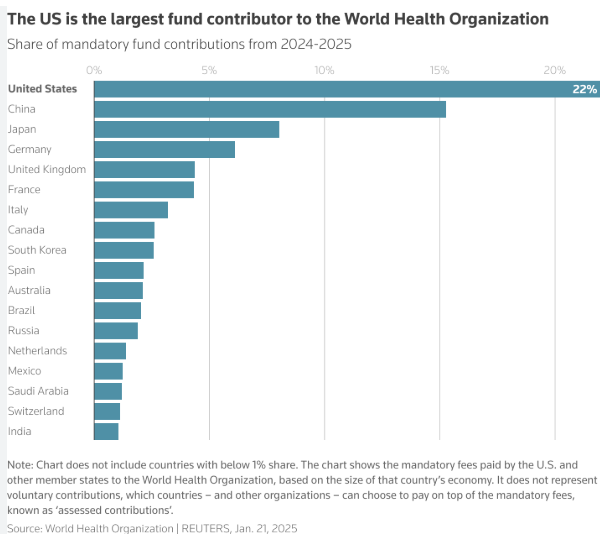Trump’s Withdrawal from WHO: Financial and Global Health Implications
(Source – Indian Express, Section – Cover Page- Page No. – 01)
| Topic: GS2 – International Relations |
| Context |
| ● On his first day in office, US President Donald Trump signed an executive order to withdraw from the World Health Organization (WHO). |
Analysis of the news:

Trump’s Withdrawal from the WHO: Reasons and Immediate Actions
- The reasons cited included the WHO’s mishandling of the COVID-19 pandemic, its failure to adopt necessary reforms, and concerns over its independence from political influences.
- The order also halted US funding to the organization, recalled American personnel, and ended negotiations on the WHO’s pandemic treaty.
- This decision, although not unexpected, has raised concerns among health experts about the resulting loss of funding and expertise for the global health body.
Financial Implications for the WHO
- The US is a major contributor to the WHO, providing around 20% of its total funding.
- Trump’s withdrawal directly impacts the organization’s finances, particularly in terms of voluntary contributions, where the US remains the largest donor.
- In contrast, China’s contributions, both mandatory and voluntary, are considerably lower.
- Experts have warned that the loss of US funding could hinder the WHO’s ability to support global health initiatives, especially in developing countries.
- Other nations, such as Australia and Indonesia, have stepped in to fill some of the financial gap, but the overall impact on global health efforts remains significant.
WHO’s Reaction and Global Health Concerns
- The WHO expressed regret over the US’s decision, emphasizing its crucial role in global health, including addressing health security and protecting the population’s well-being worldwide.
- The organization pointed to the reforms it has undertaken in recent years, highlighting its commitment to transparency and cost-effectiveness.
- However, the withdrawal threatens the collaborative framework between the US and the WHO, particularly the partnership with the US Centers for Disease Control and Prevention (CDC), which is vital for international health surveillance and response.
Impact on India and Global Health Programs
- India, which benefits from various health programs supported by the WHO, will also feel the effects of the US’s withdrawal.
- The WHO plays a significant role in India’s immunization programs, as well as efforts to combat diseases like malaria, tuberculosis, and HIV.
- A reduction in funding and the loss of US expertise may affect the WHO’s ability to provide vital health guidelines and support local health initiatives.
- Moreover, the absence of US contributions will likely strain the WHO’s capacity to assist India and other countries in tackling pressing health challenges.
Global South’s Role and the Path Forward
- The vacuum left by the US could be filled by China and countries from the global south, including India.
- Experts suggest that nations like India, South Africa, and others must step up to provide leadership and financial support for global health initiatives.
- India’s increasing role in global health, alongside its position as a voice of the global south, makes it crucial in guiding collective efforts to ensure continued progress in addressing global health challenges.
- Philanthropic organizations, such as the Bill and Melinda Gates Foundation, may also play a larger role in bridging the funding gap left by the US.
Conclusion
- The US’s withdrawal from the WHO is a significant blow to global health initiatives, particularly in terms of funding and expertise.
- The decision will affect the WHO’s ability to operate effectively, especially in countries like India that rely on its programs.
- While the global south, led by nations like India, may need to step in to fill the void, the long-term impact on global health security remains a pressing concern.
- The WHO’s response and the international community’s efforts will determine how effectively the world can address future health crises.
| What is World Health Organisation, and its objectives? |
| The World Health Organization (WHO), established in 1948, is a specialized agency of the United Nations that connects nations, partners and people to promote health, keep the world safe and serve the vulnerable – so everyone, everywhere can attain the highest level of health.
Some of the important objectives of WHO are: ● Lead global efforts to expand universal health coverage. ● Focus on the areas of disease prevention, control and elimination, and the promotion of health and well-being. ● Provide leadership on global health issues, set standards for public health, and provide technical assistance and support to countries. ● Collaborate with various partners, including other UN agencies, governments, civil society organizations, and the private sector. |
| Practice Question: Evaluate the implications of the United States’ withdrawal from the World Health Organization under President Donald Trump. (150 Words /10 marks) |
For more such UPSC related Current Affairs, Check Out –Trump’s Second Withdrawal from the Paris Agreement Signals a Major Setback for Global Climate Action
